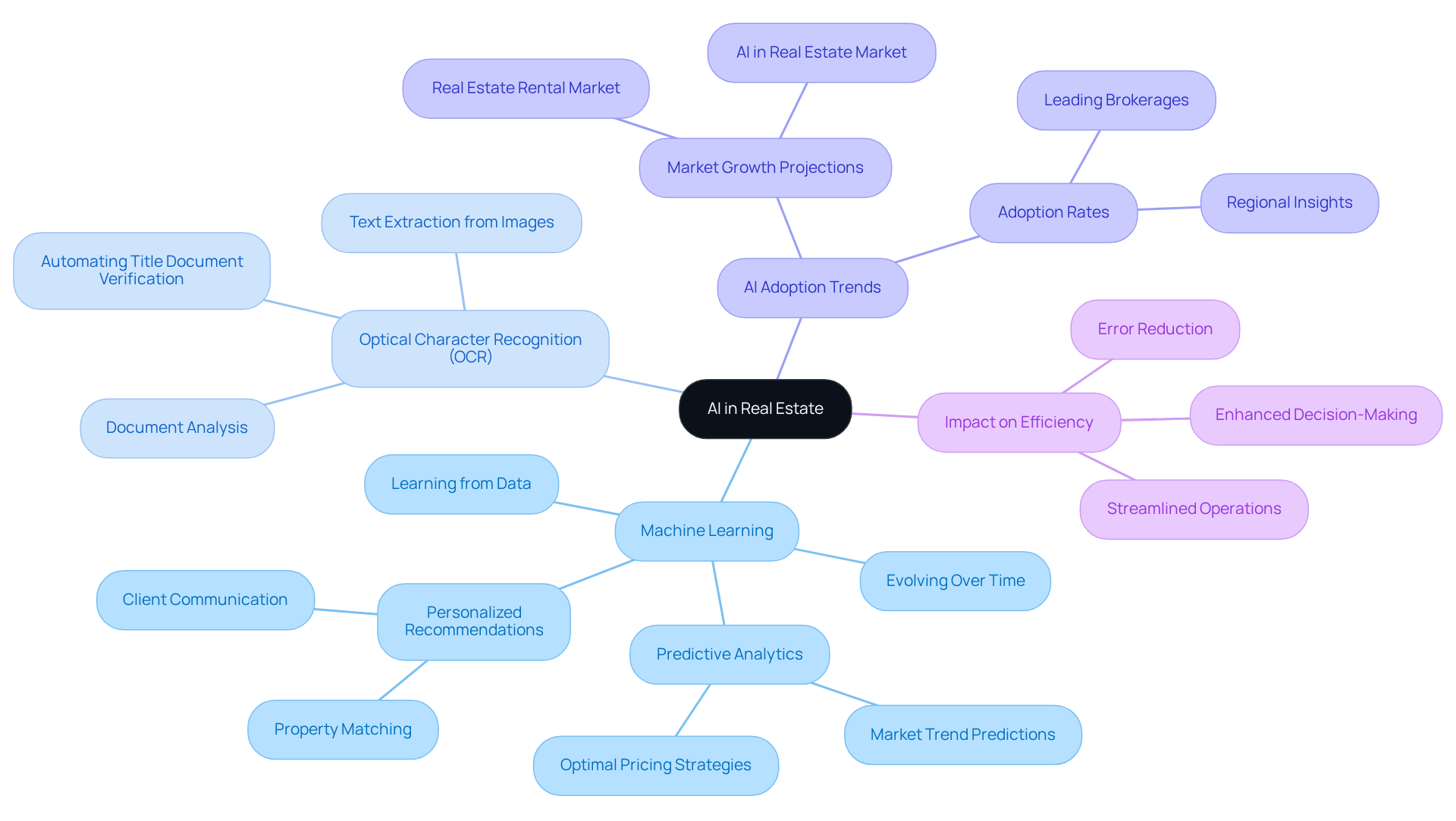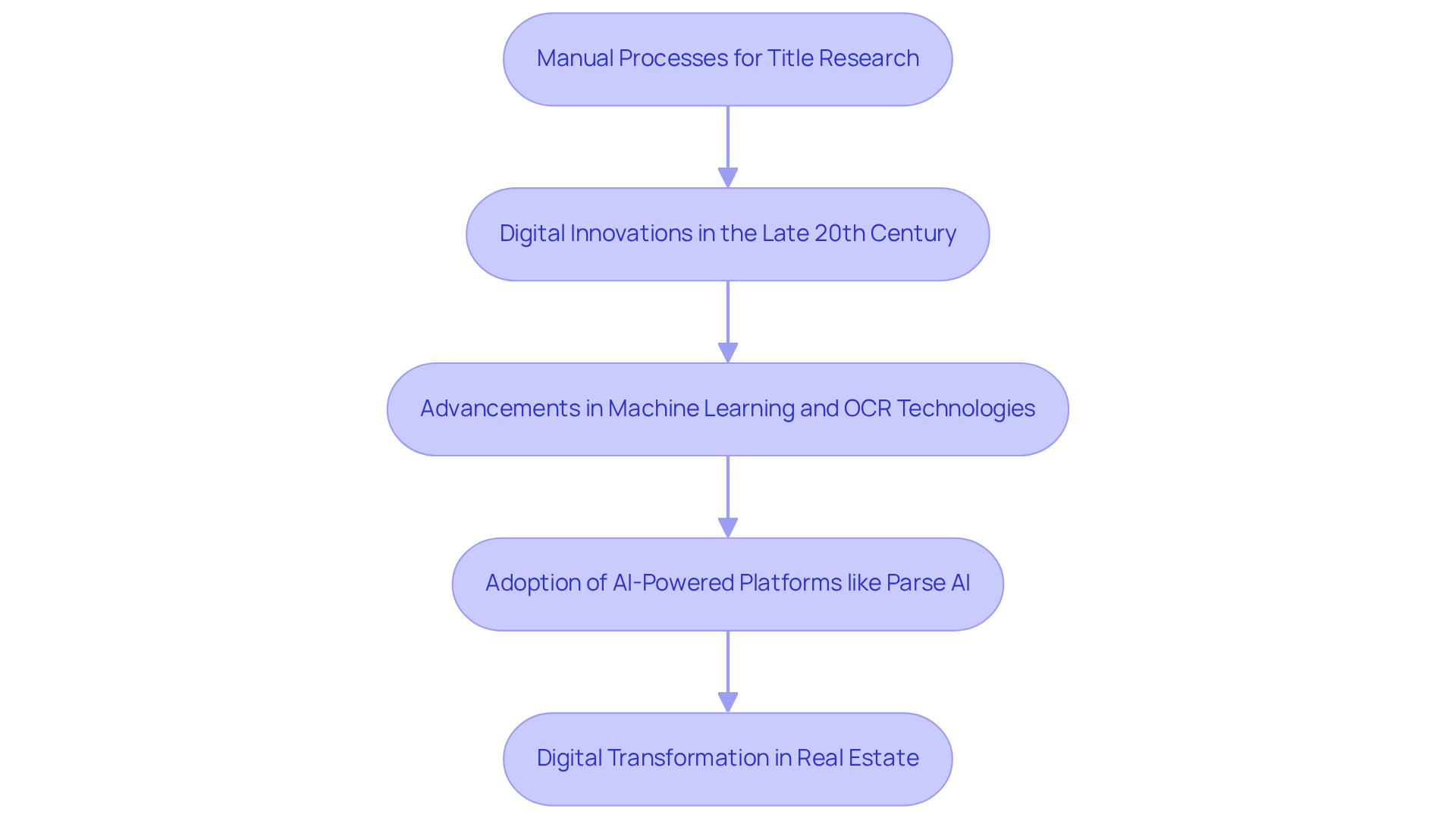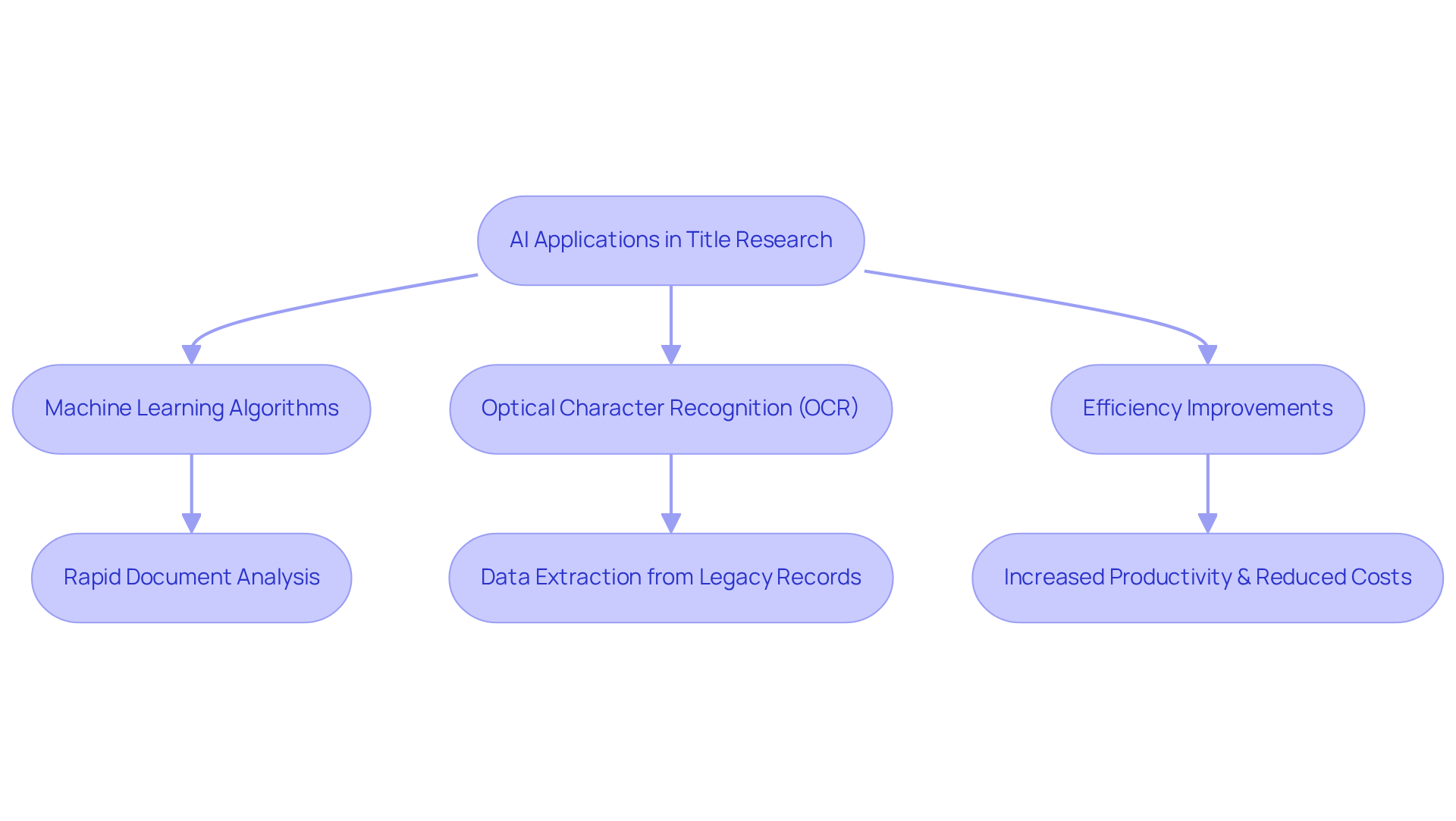Overview
AI in real estate plays a crucial role in title research by automating document analysis and enhancing accuracy through machine learning and optical character recognition (OCR) technologies. This advancement is significant, as it addresses the challenges of traditional methods that often lead to inaccuracies and inefficiencies. Furthermore, these technologies streamline workflows, reduce errors, and improve decision-making processes. Consequently, the integration of AI ultimately results in more efficient property transactions, reinforcing the reliability of these innovative solutions.
Introduction
The real estate industry is experiencing a transformative shift, with artificial intelligence (AI) emerging as a pivotal force in title research. By leveraging advanced technologies such as machine learning and optical character recognition, AI not only streamlines traditionally labor-intensive processes but also significantly enhances accuracy and efficiency.
Furthermore, as the sector embraces these innovations, critical questions arise:
- How will AI redefine the landscape of title research?
- What are the implications for real estate professionals striving for precision in an increasingly automated world?
The answers to these questions will shape the future of the industry.
Defining AI in Real Estate: Core Concepts and Technologies
What is AI in real estate signifies a pivotal advancement, utilizing sophisticated computational methods to enhance various processes within the sector. At its core, machine learning empowers systems to learn from data and evolve over time, while optical character recognition (OCR) facilitates the extraction of text from images or scanned documents. These technologies not only automate tasks that historically demanded human intervention—such as analyzing title documents and verifying property ownership—but also significantly streamline operations. Consequently, by leveraging AI, real property professionals can reduce errors and enhance decision-making processes, ultimately leading to more efficient workflows.

The Evolution of AI in Real Estate: Historical Context and Current Trends
Over the past few decades, the integration of AI into real estate has evolved significantly, prompting discussions about what is AI in real estate. The industry initially relied heavily on manual processes for title research, which were not only time-consuming but also prone to errors. The arrival of digital innovations in the late 20th century marked the beginning of a transition towards automation. As machine learning algorithms and OCR technologies advanced, real property professionals began to harness these tools to enhance their workflows.
Furthermore, recent trends indicate a growing reliance on AI-powered platforms, such as Parse AI, which provide sophisticated solutions for property analysis, helping to illustrate what is AI in real estate by facilitating quicker and more accurate ownership verification. This evolution is indicative of a broader trend towards digital transformation within the real estate sector, prompting discussions about what is AI in real estate, driven by the imperative for efficiency and accuracy.

AI Applications in Title Research: Enhancing Accuracy and Efficiency
AI applications in research are revolutionizing the industry by significantly enhancing both precision and productivity. Utilizing advanced machine learning algorithms, platforms such as Parse AI can rapidly analyze extensive collections of document titles, pinpointing relevant information and identifying inconsistencies with remarkable accuracy. This capability drastically reduces the time researchers spend on drafting abstracts and reports, allowing them to focus on more complex tasks that necessitate human judgment.
Furthermore, the integration of Optical Character Recognition (OCR) technology facilitates the efficient extraction of data from scanned documents, ensuring that even legacy records are processed seamlessly. This combination of machine learning and OCR not only streamlines the document investigation process but also minimizes errors, thereby accelerating property ownership confirmation. Consequently, real estate professionals gain access to timely and accurate information, which is essential for successful transactions.
The efficiency improvements from AI applications in document analysis are evident, with companies experiencing a notable increase in productivity and a reduction in operational costs. In fact, studies reveal that every 1% increase in artificial intelligence penetration can result in a 14.2% rise in total factor productivity. This statistic underscores the substantial impact AI can have on enhancing operational efficiency in document analysis. Moreover, case studies, such as the U.S. Army Corps of Engineers' implementation of AI for monitoring waterways, demonstrate how AI can yield significant cost savings and improved operational efficiency. By harnessing these technologies, title research is not only transformed but also strategically positioned to meet the evolving demands of the real estate market, illustrating what is AI in real estate.

Conclusion
The integration of artificial intelligence in real estate, particularly in title research, signifies a transformative shift in industry operations. By employing advanced technologies such as machine learning and optical character recognition, real estate professionals can automate time-consuming tasks, enhance accuracy, and streamline workflows. This evolution not only reduces human error but also empowers professionals to make more informed decisions based on timely and precise information.
Several key points illustrate the significant impact of AI on title research:
- The historical context reveals a transition from manual processes to automation, driven by the need for efficiency and accuracy.
- Current trends highlight the growing reliance on AI-powered platforms that facilitate quicker ownership verification and document analysis.
- The demonstrated productivity gains and cost savings underscore the value of AI in enhancing operational efficiency within the sector.
As the real estate industry continues to embrace digital transformation, understanding and leveraging AI technologies becomes paramount. Stakeholders are encouraged to explore the benefits of AI in title research, as this will not only improve their operational capabilities but also position them competitively in a rapidly evolving market. Embracing these advancements is essential for staying ahead in the industry and meeting the increasing demands for accuracy and efficiency in real estate transactions.
Frequently Asked Questions
What does AI in real estate refer to?
AI in real estate signifies a pivotal advancement that utilizes sophisticated computational methods to enhance various processes within the sector.
What is the role of machine learning in real estate?
Machine learning empowers systems to learn from data and evolve over time, enabling automation and improved analysis of various tasks in real estate.
How does optical character recognition (OCR) contribute to real estate?
OCR facilitates the extraction of text from images or scanned documents, automating tasks that traditionally required human intervention.
What tasks can AI automate in real estate?
AI can automate tasks such as analyzing title documents and verifying property ownership.
What are the benefits of leveraging AI in real estate?
By leveraging AI, real property professionals can reduce errors, enhance decision-making processes, and achieve more efficient workflows.




